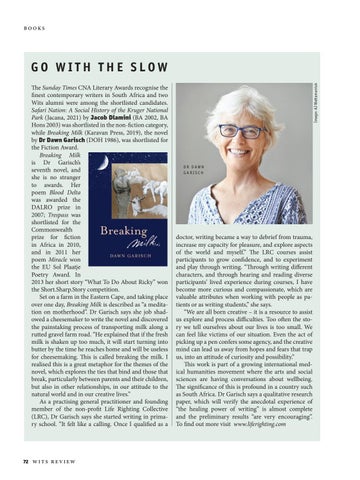BOOKS
The Sunday Times CNA Literary Awards recognise the finest contemporary writers in South Africa and two Wits alumni were among the shortlisted candidates. Safari Nation: A Social History of the Kruger National Park (Jacana, 2021) by Jacob Dlamini (BA 2002, BA Hons 2003) was shortlisted in the non-fiction category, while Breaking Milk (Karavan Press, 2019), the novel by Dr Dawn Garisch (DOH 1986), was shortlisted for the Fiction Award. Breaking Milk is Dr Garisch’s seventh novel, and she is no stranger to awards. Her poem Blood Delta was awarded the DALRO prize in 2007; Trespass was shortlisted for the Commonwealth prize for fiction in Africa in 2010, and in 2011 her poem Miracle won the EU Sol Plaatje Poetry Award. In 2013 her short story “What To Do About Ricky” won the Short.Sharp.Story competition. Set on a farm in the Eastern Cape, and taking place over one day, Breaking Milk is described as “a meditation on motherhood”. Dr Garisch says she job shadowed a cheesemaker to write the novel and discovered the painstaking process of transporting milk along a rutted gravel farm road. “He explained that if the fresh milk is shaken up too much, it will start turning into butter by the time he reaches home and will be useless for cheesemaking. This is called breaking the milk. I realised this is a great metaphor for the themes of the novel, which explores the ties that bind and those that break, particularly between parents and their children, but also in other relationships, in our attitude to the natural world and in our creative lives.” As a practising general practitioner and founding member of the non-profit Life Righting Collective (LRC), Dr Garisch says she started writing in primary school. “It felt like a calling. Once I qualified as a
72 W I T S R E V I E W
Image: AJ Wattamaniuk
GO WITH THE SLOW
DR DAWN GARISCH
doctor, writing became a way to debrief from trauma, increase my capacity for pleasure, and explore aspects of the world and myself.” The LRC courses assist participants to grow confidence, and to experiment and play through writing. “Through writing different characters, and through hearing and reading diverse participants’ lived experience during courses, I have become more curious and compassionate, which are valuable attributes when working with people as patients or as writing students,” she says. “We are all born creative – it is a resource to assist us explore and process difficulties. Too often the story we tell ourselves about our lives is too small. We can feel like victims of our situation. Even the act of picking up a pen confers some agency, and the creative mind can lead us away from hopes and fears that trap us, into an attitude of curiosity and possibility.” This work is part of a growing international medical humanities movement where the arts and social sciences are having conversations about wellbeing. The significance of this is profound in a country such as South Africa. Dr Garisch says a qualitative research paper, which will verify the anecdotal experience of “the healing power of writing” is almost complete and the preliminary results “are very encouraging”. To find out more visit www.liferighting.com
